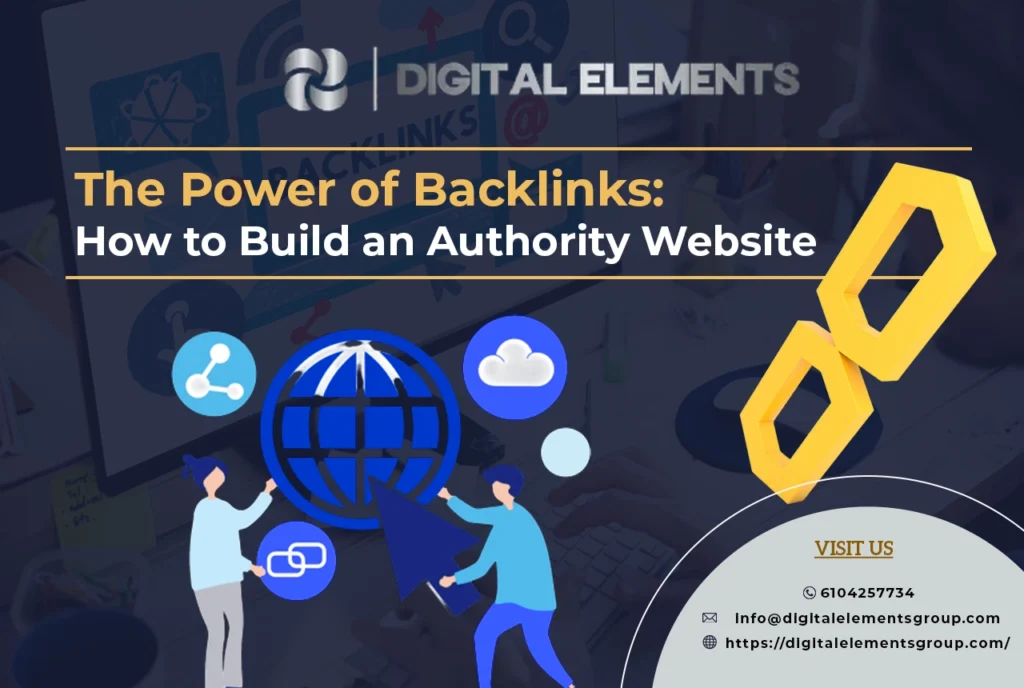In the world of digital marketing, backlinks serve as one of the most crucial ranking factors for search engines. They act as a vote of confidence, signaling to Google that your content is valuable, trustworthy, and authoritative. If you want to build an authority website, understanding and leveraging the power of backlinks is essential. In this blog post, we’ll explore the importance of backlinks, how they impact SEO, and proven strategies to build a strong backlink profile.

What Are Backlinks?
Backlinks, also known as inbound or incoming backlinks, are hyperlinks from other websites that direct users to your website. When a reputable website links to your content, search engines interpret it as an endorsement of your site’s quality.
There are two primary types of backlinks:
- Do-follow Backlinks – These links pass on link equity (also known as “link juice”) and help improve your site’s authority and rankings.
- No-follow Backlinks – These links do not pass on link equity but can still drive traffic and increase brand awareness.
Why Are Backlinks Important?
Backlinks play a significant role in SEO because they:
- Improve Search Engine Rankings – Websites with a higher number of quality backlinks tend to rank better in search engine results pages (SERPs).
- Increase Website Authority – Google’s algorithm considers backlinks as a signal of a site’s credibility and trustworthiness.
- Drive Referral Traffic – Backlinks from high-traffic websites can bring new visitors to your site.
- Faster Indexing – Search engine bots use backlinks to discover and index new pages more quickly.
- Enhance Brand Exposure – Being linked from authoritative sources boosts your brand’s reputation and visibility.
How to Build High-Quality Backlinks
Now that you understand the importance of backlinks, let’s explore actionable strategies to build a strong backlink profile and establish your website as an authority in your industry.
1. Create High-Quality, Shareable Content
Content is king when it comes to earning backlinks. Focus on creating valuable, informative, and engaging content that naturally attracts links. Some content formats that generate backlinks include:
- In-depth Guides and Tutorials – Comprehensive guides that provide step-by-step solutions.
- Infographics – Visual content is highly shareable and often cited by other websites.
- Original Research and Data – Unique studies, surveys, or reports can attract backlinks from industry publications.
- Case Studies – Detailed case studies showcasing results from your strategies are valuable to industry experts.
- List Posts and Roundups – Curated lists of tools, resources, or experts in your niche.
2. Leverage Guest Blogging
Guest blogging involves writing high-quality content for other reputable websites in your industry. In return, you get a backlink to your site. To make guest blogging effective:
- Find authoritative websites in your niche that accept guest posts.
- Pitch unique and valuable content ideas.
- Write well-researched, engaging, and original content.
- Include a natural, contextual backlink to your website.
3. Build Relationships with Industry Influencers
Networking with industry experts and influencers can help you earn high-quality backlinks. Here’s how you can do it:
- Engage with their content by commenting and sharing their posts.
- Offer valuable insights and collaborations.
- Request backlinks by highlighting how your content adds value to their audience.
- Get featured on industry podcasts, webinars, or interviews.
4. Use Broken Link Building
Broken link building involves finding broken links on authoritative websites and offering your content as a replacement. To implement this strategy:
- Use tools like Ahrefs or Check My Links to identify broken links.
- Reach out to the website owner, informing them of the broken link.
- Suggest your relevant content as a replacement.
- Politely ask for a backlink in exchange.
5. Create Link-Worthy Resources
Publishing resourceful content that others find useful increases your chances of earning backlinks. Some effective resource-based content ideas include:
- Ultimate Guides – In-depth articles covering all aspects of a specific topic.
- Industry Reports – Detailed reports analyzing trends, statistics, or insights.
- Free Tools and Templates – Providing free downloadable tools, calculators, or templates.
- Expert Roundups – Featuring insights from industry leaders to attract more backlinks.
6. Get Listed in Business Directories and Citations
Submitting your website to high-authority business directories and niche-specific directories helps with link building. Some authoritative directories include:
- Google My Business
- Yelp
- Better Business Bureau (BBB)
- Chamber of Commerce websites
- Industry-specific directories
7. Conduct Competitor Backlink Analysis
Analyzing your competitors’ backlink profiles can help you uncover link-building opportunities. Use SEO tools like Ahrefs, SEMrush, or Moz to:
- Identify websites linking to your competitors.
- Reach out to those websites and pitch your content.
- Replicate successful backlink strategies used by your competitors.
8. Utilize HARO (Help a Reporter Out)
HARO connects journalists with industry experts looking for sources. By responding to queries related to your niche, you can earn backlinks from high-authority news websites. To succeed with HARO:
- Sign up for daily journalist requests.
- Provide well-researched, valuable insights.
- Include a short bio and a link to your website.
9. Optimize Internal Linking
While external backlinks are essential, internal linking also plays a crucial role in SEO. Proper internal linking:
- Helps distribute link equity across your website.
- Improves user experience and navigation.
- Increases page authority within your website.
Ensure that you:
- Link to relevant internal pages naturally.
- Use descriptive anchor texts.
- Avoid excessive linking on a single page.
10. Engage in Digital PR and Press Releases
Getting featured in news articles, industry blogs, and online publications can earn you powerful backlinks. To boost digital PR efforts:
- Publish newsworthy content, such as product launches or company milestones.
- Reach out to journalists and bloggers.
- Submit press releases to PR distribution websites.
Backlinks are the backbone of SEO and play a significant role in building an authority website. However, the key to successful link building lies in focusing on quality rather than quantity. By creating valuable content, leveraging guest blogging, engaging with influencers, and using strategic outreach techniques, you can establish your website as a trusted authority in your industry.
Implement these backlink strategies consistently, monitor your progress using SEO tools, and adapt your approach as needed. With time and effort, your website will gain higher search engine rankings, increased traffic, and enhanced credibility.
Need help with backlink building? Digital Elements Group specializes in SEO and link-building strategies to help businesses establish authority online. Contact us today to elevate your website’s performance!



